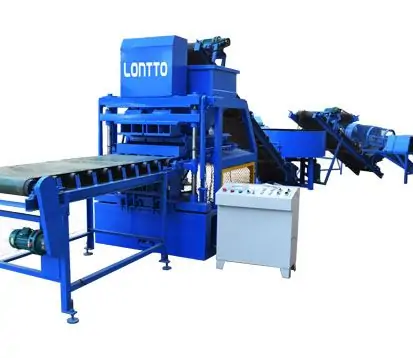Choosing the right clay brick making machine can significantly impact production efficiency and product quality. With various options available, it’s crucial to consider factors like capacity, technology, and cost-effectiveness. Manufacturers exploring their options should look into the Lontto clay brick making machine, known for its innovative features and reliability. This article dives into essential considerations that will help manufacturers make informed decisions, ensuring they invest in a machine that meets their specific needs and boosts their business potential.
Overview of Clay Brick Making Machines
Clay brick making machines are essential tools for producing high-quality bricks. These machines automate the process of shaping and forming bricks from clay, ensuring consistent quality and efficiency.
Different types of clay brick making machines exist, each offering unique capabilities. For instance, manual machines require human effort for operation, while automated machines utilize advanced technology to streamline production.
Key features to consider include production capacity, which indicates the number of bricks produced per hour, and energy consumption, which impacts operational costs. Additionally, the technology employed, such as stiff extrusion or soft mud processes, affects the final quality of the bricks.
Investing in a reliable clay brick making machine can improve production flow and reduce labor costs. It’s important to assess the specific needs of the manufacturing operation, ensuring that the selected machine aligns with desired output and product specifications.
Key Factors to Consider
When selecting a clay brick making machine, several key factors directly impact production efficiency and product quality.
Production Capacity
Production capacity refers to the number of bricks a machine can produce within a specific timeframe. It’s essential to match the machine’s capacity with the expected demand. Machines typically range from a few hundred to thousands of bricks per hour. Evaluating current and projected production needs helps manufacturers choose the right machine size for sustainable output.
Machine Durability
Machine durability indicates the longevity and reliability of the equipment. Constructed from high-quality materials, robust machines withstand wear and tear over time. Regular maintenance can improve durability, minimizing downtime and repair costs. Evaluating the manufacturer’s warranty and after-sales support also contributes to assessing long-term durability.
Energy Efficiency
Energy efficiency measures how effectively a machine converts energy consumption into productive output. High energy efficiency reduces operational costs and contributes to a more sustainable manufacturing process. Look for machines that use modern technology to minimize energy use while maintaining high productivity levels.
Automation Level
Automation level determines the extent to which a machine operates automatically versus manually. Highly automated machines can streamline production processes, reduce labor costs, and improve overall efficiency. Understanding the desired level of automation helps manufacturers balance costs with the benefits of increased productivity and reduced human error.
Cost Analysis
Cost analysis is essential when selecting a clay brick making machine. It involves understanding initial investment, maintenance costs, and long-term operational expenses to ensure a financially sound decision.
Initial Investment
Initial investment includes the purchase price of the clay brick making machine and any additional costs for installation. Prices can range significantly based on type and capacity. Automated machines typically cost more than manual options. It’s crucial to evaluate financing options and potential returns on investment (ROI) to justify this expense effectively.
Maintenance Costs
Maintenance costs refer to ongoing expenses necessary for keeping the machine operational. These costs can include regular servicing, part replacements, and labor. Routine maintenance is essential to prevent breakdowns and ensure longevity. Manufacturers should negotiate service agreements or warranties that cover essential maintenance to manage expenses effectively.
Long-Term Operational Expenses
Long-term operational expenses encompass energy consumption, labor, and material costs. Automated machines may offer decreased labor costs, but energy efficiency is vital for controlling utility bills. Assess energy consumption rates against production output to determine overall efficiency. Additionally, consider fluctuations in raw material prices to predict future costs accurately. Understanding these factors helps in maintaining profitability over time.
Additional Features
Selecting the right clay brick making machine involves considering additional features that improve functionality and safety.
Customization Options
Customization options allow manufacturers to tailor machines to their specific needs. Many machines offer adjustable settings for brick size and shape, accommodating diverse market demands. Some manufacturers offer modular designs that facilitate easy upgrades and modifications as production needs change. Features like interchangeable molds and adjustable extrusion pressure improve flexibility in production.
Safety Features
Safety features are crucial for protecting operators and ensuring smooth operations. Emergency stop buttons, safety guards, and automatic shut-off systems reduce the risk of accidents during high-speed production. Additionally, machines with safety interlocks prevent operation when access panels are open. Ergonomic designs can also decrease operator fatigue, promoting a safer and more productive work environment.
Conclusion
Choosing the right clay brick making machine is essential for optimizing production and ensuring high-quality output. By considering factors like capacity technology and cost-effectiveness manufacturers can make informed decisions that align with their specific needs.
Investing in a machine that offers durability energy efficiency and automation can significantly improve operational efficiency. Additionally prioritizing safety features and customization options ensures a smooth production process while protecting operators.
Ultimately the right machine not only meets immediate demands but also supports long-term profitability and growth in the competitive brick-making industry.





